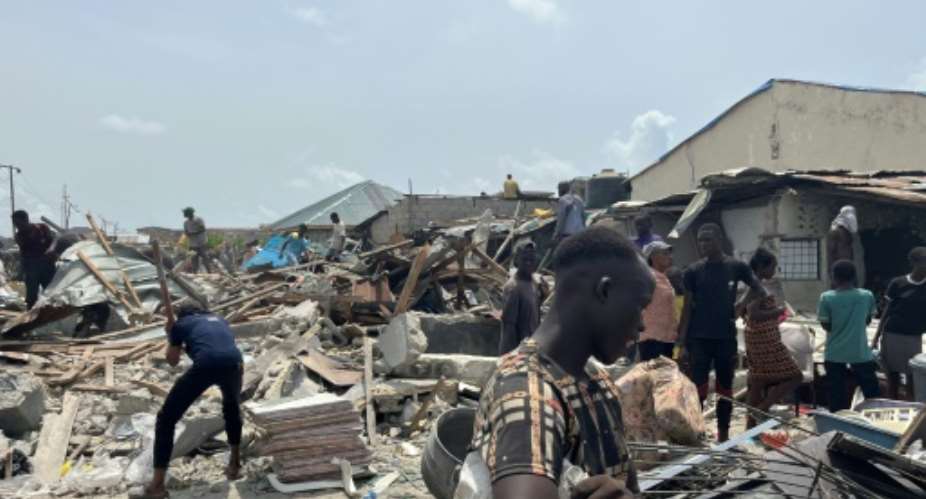Ebuka Gbuzue pulled everything he could from his family's small home in Lagos before demolition crews came to destroy it.
This week the local government began a huge operation to raze areas of the eastern Jakande district in Nigeria's economic capital and make way for a coastal mega-highway.
Gbuzue, 35, heaved mattresses and furniture into a trailer bound for the other side of the city of 20 million people, where his wife and two children had already taken shelter.
But he slept near the wreckage of his house that night because he couldn't afford to pay more for his commute to work the next day.
"We are refugees in our own country," he told AFP.
The 10-lane, 700-kilometre (435-mile) highway will link Lagos with the city of Calabar in the far east of Nigeria.
But Kunle Adeshina, the Lagos environment ministry's director of public affairs, said the demolitions were also "about the regeneration of the city."
The authorities say the houses are illegal, and Adeshina pointed to the arrest of seven people for allegedly carrying guns and confronting enforcement officers in the neighbourhood on Tuesday.
"The state cannot allow criminals," he warned.
From a population of around 200,000 in the 1960s, Lagos is now neck and neck with Kinshasa in the DR Congo for the title of Africa's most populous city, and could become the world's most populous by 2100, according to the Climate Central NGO.
Many in the lagoon-side metropolis live in informal settlements.
 Residents carry their belongings after the demolitions. By Leslie Fauvel (AFP)
Residents carry their belongings after the demolitions. By Leslie Fauvel (AFP)
Residents in Jakande had been told homes along the highway route would be destroyed imminently, and some thought it was just a rumour -- but the sudden arrival of the diggers caught several thousand families off guard.
As crammed trucks made their way through clouds of dust, men picked through ruined streets looking for scrap metal to sell, while women and children waited with hurriedly-packed suitcases for a ride out.
'No place to stay'
Blessing John, a 35-year-old mother, wiped away tears as she tried to drag an old foam mattress through the rubble.
Nine months pregnant and about to give birth, she said she had no choice but to spend the night on the street.
 A Lagos environment ministry spokesman said the demolitions were also 'about the regeneration of the city'. By Leslie Fauvel (AFP)
A Lagos environment ministry spokesman said the demolitions were also 'about the regeneration of the city'. By Leslie Fauvel (AFP)
She was one of many unsure where to go.
"We will sleep here tonight, there is nothing else to do," said Peter Nwakpa Chinedu, standing next to the digger that had just flattened the house where he lived with 10 members of his family.
Many of Jakande's residents were rehoused in the district after local authorities evicted them from nearby Maroko in 1990.
The Lagos government gave them deeds to flats in buildings that were never completed, and many residents now live in small cement houses beside the unfinished structures.
 Many of Jakande's residents had already been rehoused after a previous eviction nearby. By Leslie Fauvel (AFP)
Many of Jakande's residents had already been rehoused after a previous eviction nearby. By Leslie Fauvel (AFP)
It's the second time in 34 years that Omolola Adekule, 68, has seen her home demolished.
"They scattered my house in Maroko, they scattered my house in Jakande," she said. "I'm not feeling good -- my blood pressure is high. We have no place to stay."
The last major eviction in Lagos took place in 2020, when the army ordered thousands of residents to leave Tarkwa Bay beach following accusations that national oil company infrastructure there was vandalised.
Since Nigerian President Bola Ahmed Tinubu came to power and brought in reforms last year, Nigeria has plunged deep into an economic crisis.
The inflation rate approached 30 percent in January and millions of Nigerians are struggling to buy food.
Ena Patrick, 48, a teacher in Jakande whose school was destroyed, said she was shocked the government pushed ahead with the plan at such a tough time.
"There's no food to eat and our houses are being demolished," she said. "Why now?"





 We saved $57.9million from procurement of new verification devices, registration...
We saved $57.9million from procurement of new verification devices, registration...
 Ejisu by-election: Aduomi is a betrayer – Ahiagbah
Ejisu by-election: Aduomi is a betrayer – Ahiagbah
 Dumsor: I’ll be in police custody if I speak, I vex — DKB
Dumsor: I’ll be in police custody if I speak, I vex — DKB
 We'll give daily evidence of Akufo-Addo's supervised thievery from our next gene...
We'll give daily evidence of Akufo-Addo's supervised thievery from our next gene...
 Asiedu Nketia crying because they've shared the positions and left him and his p...
Asiedu Nketia crying because they've shared the positions and left him and his p...
 Mahama's agenda in his next 4-year term will be 'loot and share' — Koku Anyidoho
Mahama's agenda in his next 4-year term will be 'loot and share' — Koku Anyidoho
 If you're president and you can't take care of your wife then you're not worth y...
If you're president and you can't take care of your wife then you're not worth y...
 Foreign Ministry caution Ghanaians against traveling to Northern Mali
Foreign Ministry caution Ghanaians against traveling to Northern Mali
 GHS warns public against misuse of naphthalene balls, it causes newborn jaundice
GHS warns public against misuse of naphthalene balls, it causes newborn jaundice
 Our education style contributes to unemployment - High Skies College President
Our education style contributes to unemployment - High Skies College President
